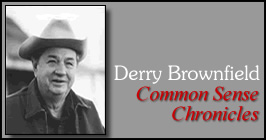Other
Brownfield
Articles:
Fear Not-The
Odds Are on
Your Side
Derry Brownfield
April 1, 2007
NewsWithViews.com
During 2006 I wrote several articles concerning our economy and comparing it to the 1960s, 70s and 80s. As I stated in the November issue of my newsletter (The Common Sense Chronicle) "When The Note Comes Due," during the 1960s and 70s, farmers were borrowing their way into prosperity. I mentioned how desirable the economy looked at that time and how rapidly it took a nosedive during the 80s, as farmers and their bankers went broke. In the Winter 2007 edition of a publication of the Federal Reserve Bank of Kansas City, Thomas M. Hoenig, President of the Federal Reserve Bank of Kansas City States: "This time it's different (or is it?)
I have stated many times that the very smart people of the world agree with me! That being the case, Mr. Hoenig is highly intelligent. I quote from his article:
"Those of you with several years of experience may recognize that many of the things we are hearing today about the economy have counter-parts in the past: Asset values are appreciating, farmland values are strong and we are all well aware of what has occurred this year in the energy markets. At the start of the 1980s we were told that oil prices could only go higher, farmland was a solid investment and housing and stock markets would continue to climb. You will recall that several of the financial decisions made on those speculative forecasts created their own sets of problems, some reaching far beyond local banks. Through the late 70s and 80s confidence abounded among borrowers and bankers."
Hoenig said, "I believe that this is a particularly apt time to take a retrospective look at banking and finance. We now have a new generation of bankers who haven't experienced much in the way of a substantial banking downturn. District bankers played various roles in speculative booms in agriculture, energy and commercial real estate, which all came to a precipitous end. The price of crude oil rose from $2.75 a barrel in 1973 to a peak of nearly $37 in 1981 before dropping to $10 in 1986. Similarly, farmland values rose by more than fourfold in the 10-year period before 1982, but then dropped by 45% during the next five years. Inflation was around 13% at the beginning of the 1980s and the prime rate reached 20.5% in 1981. During the 1980s, 309 banks failed in the Kansas City Federal Reserve District alone. Most banks in the 80s, like banks today, were well-run, prudent and successful. But some managers couldn't resist the possibility of greater profit. Age old behaviors such as greed, shortsightedness and arrogance are at the center of these problems and they are with us today just as they were in the 1980s."
Thomas Hoenig continues: "My purpose is not that I think a return to a 1980s-style crisis is imminent. However, those who in the early 1980s predicted an endless rise in energy markets and real estate values were as confident in their outlook as we are today. Although the world has changed during the last quarter of a century, at least one thing has not: human nature. Greed, pride, arrogance and other human frailties are often the root of bad decisions, and those qualities remain with us today. They still motivate behavior as they have in the past, and in many cases these frailties keep us from acting on the lessons we should have learned from previous generations."
I was writing this article in the presence of my daughter. Her comment, "Why don't you write something positive?"
I'm going to close this article with the same paragraph I used in closing my November article Titled: "WHEN THE NOTE COMES DUE." Mr. Thomas Hoenig, President of the Federal Reserve Bank of Kansas City and Derry Brownfield have been there and done that.
|
Subscribe to the NewsWithViews Daily News Alerts! |
"When I point
this information out to my friends they tell me that I am just a pessimist
and I need to be more upbeat in my thinking. I was very upbeat in my thinking
during the 1950's, 60's and 70's, but 20 percent interest on un-payable
mortgages changed by thought life. When the notes come due and you're
in the "sweat box" with the president of the bank and it's your
turn to explain those foreclosure notices; you go from being just a pessimist
to being a realist. Sooner or later - tomorrow, next month, next year
- sometime in the future, the bankers will want their money. Those notes
will come due."
Derry Brownfield was born in 1932 and grew up during the depression. He is a farmer and a broadcaster. Derry attended the College of Agriculture at the University of Missouri where he received his B.S. and M.S. degrees. He taught Vocational Agriculture several years before going to work as a Marketing Specialist with the Missouri Department of Agriculture. Derry served as Director of the Kansas City Livestock Market Foundation at the Kansas City Stockyard prior to establishing himself in farm broadcasting.
Derry started farming when he was 16 years old and received the Future Farmers of America State Farmer degree in 1949. Since that time the Brownfield Farm has grown to over 1000 acres maintaining a herd of 200 registered Charolias cows.
In 1972, Derry and his partner established the Brownfield Network which now serves 250 radio stations throughout the Midwest with news and market information. In 1994, Derry started his own syndicated radio talk show and he is one of the most popular radio talk show hosts in America. The Derry Brownfield Show can be heard on approximately 80 radio stations in 23 states. With his entertaining sense of humor and witty commentary he has captured audiences for over 30 years. His ability to present an informative talk show while being light and colorful is why he has a large loyal listening audience.
Derry Brownfield is a practical farmer, a practical business man and a very entertaining speaker. He travels extensively throughout the country speaking about his common-sense point of view.
Web Site: www.derrybrownfield.com
E-Mail: derrybrownfield@learfield.com
...during the 1960s and 70s, farmers were borrowing their way into prosperity. I mentioned how desirable the economy looked at that time and how rapidly it took a nosedive during the 80s, as farmers and their bankers went broke.








